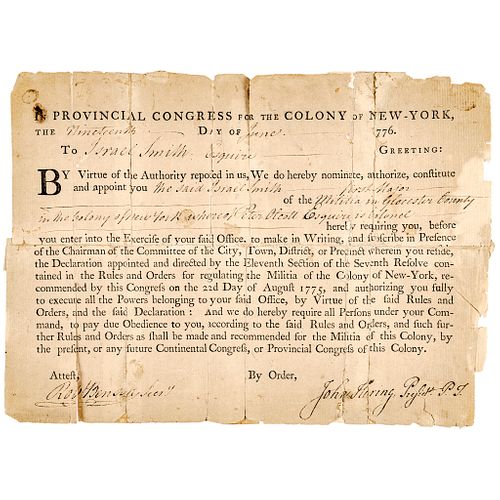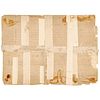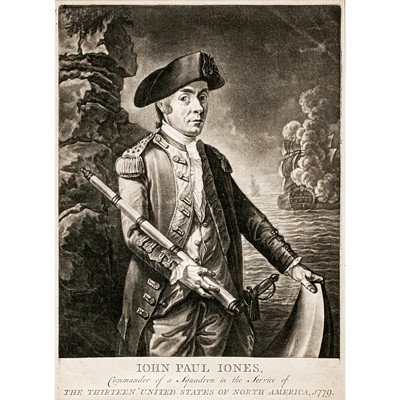1776 Revolutionary War Era Military Appointment by the Provincial Congress
Lot 82
Categories
Estimate:
$800 - $1,200
Absentee vs Live bid
Two ways to bid:
- Leave a max absentee bid and the platform will bid on your behalf up to your maximum bid during the live auction.
- Bid live during the auction and your bids will be submitted real-time to the auctioneer.
Bid Increments
| Price | Bid Increment |
|---|---|
| $0 | $10 |
| $200 | $20 |
| $300 | $25 |
| $500 | $50 |
| $1,000 | $100 |
| $2,000 | $200 |
| $3,000 | $250 |
| $5,000 | $500 |
| $10,000 | $1,000 |
| $20,000 | $2,000 |
| $30,000 | $2,500 |
| $50,000 | $5,000 |
| $100,000 | $10,000 |
| $200,000 | $20,000 |
| $300,000 | $25,000 |
| $500,000 | $50,000 |
About Auction
By Early American History Auctions
Jan 23, 2021
Set Reminder
2021-01-23 12:00:00
2021-01-23 12:00:00
America/New_York
Bidsquare
Bidsquare : Early American History Auction of Autographs, Americana, Political & Maps
https://www.bidsquare.com/auctions/early-american-history-auctions/early-american-history-auction-of-autographs-americana-political-maps-6311
311 Lots of Rare, Historic Autographs, Americana, Civil War Era, George Washington, Abraham Lincoln, Slavery & Black History, Revolutionary War Era, Colonial America, Federal Period, War of 1812, Colonial Currency, Indian Peace Medals & more... Early American History Auctions auctions@earlyamerican.com
311 Lots of Rare, Historic Autographs, Americana, Civil War Era, George Washington, Abraham Lincoln, Slavery & Black History, Revolutionary War Era, Colonial America, Federal Period, War of 1812, Colonial Currency, Indian Peace Medals & more... Early American History Auctions auctions@earlyamerican.com
- Lot Description
American Revolution
Revolutionary War Military Appointment by the Provincial Congress for the Colony of New York, signed less than one month before America declared its Independence from Great Britain
June 19, 1776-Dated Revolutionary War Period, Partially-Printed Document, "First Major" Military Appointment by the Provincial Congress for the Colony of New York Signed, "John Haring, Presidt. P.T.," Signed less than one month before America Declared its Independence from Great Britain, Very Good.
This "Provincial Congress for the Colony of New York," Partly-Printed Document is on laid period paper, accomplished in Manuscript as the Appointment of "Israel Smith, Esq. as First Major in the Colony of New York whereof Peter Alcott, Esquire is Colonel." Signed by Robert Benson as Secretary, and John Haring as President Pro-temp. Haring was elected to the New York Provincial Congress (or revolutionary government) five times from 1775 to 1777. In two of those sessions he was the President Pro Temp of that body. He served in the NY State Senate from 1781 to 1789, and was returned to national Continental Congress from 1785 to 1787. This Appointment measures 8.25" x 11.25", the paper is evenly toned with numerous old paper tape repairs on the blank reverse primarily along fold lines with some splits, some light chipping and loss along the outer edges. However, the importance of this fully signed and issued Document far outweighs the condition issues and on the plus side, the signatures are crisp and bold, despite the fold splits that intersect them. Of the named individuals on this Document, Robert Benson is perhaps the most famous, having had his Portrait painted by American artist and aide to General George Washington, John Trumbull in 1804.
John Haring (September 28, 1739 - April 1, 1809) was an American lawyer from New York City. He was a Delegate for New York to the Continental Congress.
Haring was born to a large Dutch family at Tappan, New York which was then part of Orange County. He was the fourth of eight children. His parents were Colonel Abraham and Martyntje (Bogart) Haring, and he was christened "Jan" at the Dutch Reformed Church of Tappan. He remained a member of that church throughout his life.
Haring attended school and read law in New York City and was admitted to the bar. He practiced both in the city and in Orange County. He married a cousin, Maria Haring, on October 3, 1773. The couple would have eight children: Maria, Samuel, Elbert, Martyntje, Elisabeth, Margaret, John, and Nicholas.
John took his place in a family that was locally prominent. He served as a county judge. As the American Revolution neared he became a member and then head of Orange County's Committee of Correspondence. In 1774, the county established their own form of self-government, by adopting the "Orangetown Resolutions," which had been drafted by John and his brother Peter.
One point in these Resolutions was a non-importation agreement which embargoed British goods. When they sent Haring to the Continental Congress in Philadelphia, it adopted a very similar agreement on October 20, 1774.
Haring was elected to the New York Provincial Congress (or revolutionary government) five times from 1775 to 1777. In two of those sessions he was the President Pro Tem of that body. He served in the NY State Senate from 1781 to 1789, and was returned to national Continental Congress from 1785 to 1787.
In 1784 the New York state legislature was busy revising vestiges of the various laws and institutions from their colonial form to one befitting a free state. In 1755 a charter from the crown had established King's College in New York City. This year it got a new charter, incorporating it as Columbia College. The charter established a board of regents, and named twenty-four original men, including John Haring. He remained in that post until his resignation in 1787.
In 1788 Haring was a delegate to the New York convention that ratified the U.S. Constitution. His vote, however, was against ratification, since he believed a stronger recognition of state and individual rights was required.
In 1794, he removed to Bergen County, New Jersey, and was a member of the New Jersey Legislature in 1795-96. About 1804, he returned to Tappan, NY, and was a presidential elector in 1804, voting for Thomas Jefferson and George Clinton. He was again a member of the New York State Assembly in 1806. He died at Blauvelt, New York on April 1, 1809, and is buried in the Dutch Reformed Church cemetery at Tappan. His wife Maria survived him, and lived until 1825.
Robert Benson (1739-1823), the eldest son, inherited his father's brewery. He continued as a brewer for awhile but eventually sold the property. During the American Revolutionary War he served as a member of the first Committee of Safety, was Secretary of the first convention, and was aide-de-camp of Governor George Clinton. Following the American Revolution, he acquired farmland in Brooklyn. Robert bought, sold, and owned land in several areas of Brooklyn, including what is now the neighborhood of Brooklyn Heights. The town and area once known as New Utrecht, which now includes the neighborhood of Bensonhurst, bears the Benson family name.
- Shipping Info
-
Early American provides in-house worldwide shipping. Please contact us directly if you have questions about your specific shipping requirements.
-
- Buyer's Premium



 EUR
EUR CAD
CAD AUD
AUD GBP
GBP MXN
MXN HKD
HKD CNY
CNY MYR
MYR SEK
SEK SGD
SGD CHF
CHF THB
THB












